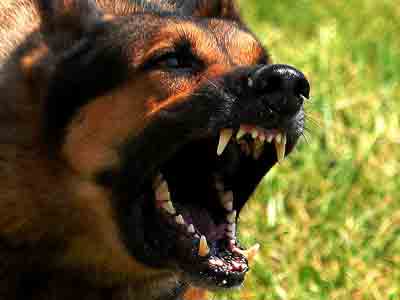Dog
Breeds Info
Information on Dog Breeds from A
to Z
|
|
|
Why Dogs Become Aggressive
We forget on occasion, but dogs are naturally pack animals. As such, they crave leadership from an alpha in the pack, and if you aren’t acting as that alpha, they may see fit to take over that position. In situations like this, and especially if your dog isn’t naturally an alpha type, they will be immensely stressed to the point of constantly being “on,” meaning they’ll be on a hair trigger with many of their responses. For instance, if your dog sees
another dog, they may be more inclined to bite at them or start fighting if they’re in a stressed out forced alpha
state of mind. If, however, they feel you’re the alpha in your family pack, they’ll leave the business of deciding
threats to you. If they see you reacting to this intrusion as nothing to get worked up about, and they trust your
judgment, then they’re less likely to cause a problem. Discipline is important with dogs since, again, they crave (fair) leadership, but the way you discipline needs to reflect how you’d like your dog to act later, much the same way as children. If you see your dog sleeping on the couch and have been training him to stay off, a strong “No” command, a spray with a water bottle, or a couple raps with a newspaper are much preferred over real physical harm. A spanking now and then isn’t a problem since your dog can sense when you’re just showing leadership instead of brute strength, but strong beatings will result in your dog learning that that’s how things need to get done. This will train them to respond more harshly when something has bothered them, and that only compounds into worse and worse behaviors. Then again there are times when dogs will just be dogs. When scared, your dog may be in a state where his natural instinct is to fight, so even a slight touch will cause him to bite or snarl. This doesn’t necessarily mean anything against you; it could just be nerves. If this seems to be the case and isn’t typical at all, then you’re dog is probably not really aggressive by nature and just needs some space to process what’s happening. Dogs are entirely capable of being the sweetest, most pleasant creatures on the planet, but they’re also capable of being aggressive animals as well. Their disposition will go a long to show how aggressive they will naturally become, but we can do a lot to persuade them one way or the other. Show your pooch some love and you will be loved in return. Show them anger, and they will return it in spades.
Related Articles
Reasons to Choose Organic Dog Food The Best Dogs for Senior Citizens Basic Principals for Better Health and Safety of Dogs 5 Ways To Keep Your Dog Healthy and Safe How to Avoid Dehydration for Dogs How to Choose A Dog That's Right For You How to Get Your Dog to Stop Barking How To Avoid Worms In Your Dog Poisons To Keep Away From Your Dog Safety Dogs for Autistic Children Buying a Dog From a Rescue: What To Look Out For 5 Common Household Toxins and Your Dog 5 Tips For Dog Show Preparation Clipping Dog Nails: A How To Guide Children and Dogs: Is your Child Ready For a Dog? Dogs and Fleas: How to Treat Your Dog's Fleas 5 Ways To Exercise With Your Dog Brushing Dog Teeth: A How To Guide Overweight Dog? The Doggy Diet 5 Useful Tips For Dog Paw Care When To Euthanize Your Dog: Making The Decision How to Stop Your Dog From Jumping 5 Tips To Managing Shedding Dogs Where You Should Look to Find Your Puppy Three Main Keys to Owning a Healthy and Happy Dog Dog First Aid: How To Treat Wounds and the Supplies You Need The Options for Paying Those Costly Vet Bills Tips to Maintain a Healthy Dog or Puppy for Life Things to Consider Before Buying a Puppy Useful Information for Dog Breeding Training Your Dog to Walk with a Leash Most Popular Dog and Puppy Names of 2011 Dealing with your Dog's Sleeping Habits Why You Really Shouldn't Feed Your Dog Scraps Why Don't Some Dogs Like Strangers? To Breed for the AKC Standards or Not Why You Should Check for Corn in Your Dog Food Dealing With Your Dog's Ear Infection Shock Collars and Electric Dog Fences Foods to Keep Away From Your Dog Should You Feed Your Dog a Raw Food Diet? Calming Your Dog Around Thunder Things to Consider When Moving While Owning a Dog Why You Should Get Your Dog Fixed Learning to Live With a Dog When You Don't Want To What to Do if You Are Attacked By a Dog |
|
Copyright 2010. All Rights
Reserved.
www.dogbreedsinfo.org
 A lot of dog owners out there can’t even fathom the notion that their sweet,
innocent pup has the capability of becoming a primal animal. Dogs are trained more than anything to be
friendly and gentle, also known as domesticated, but there are other instances where for whatever reason, the
dog becomes far more aggressive than you’d prefer. There are however reasons for this. Here is why dogs become
aggressive.
A lot of dog owners out there can’t even fathom the notion that their sweet,
innocent pup has the capability of becoming a primal animal. Dogs are trained more than anything to be
friendly and gentle, also known as domesticated, but there are other instances where for whatever reason, the
dog becomes far more aggressive than you’d prefer. There are however reasons for this. Here is why dogs become
aggressive.